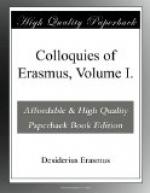Ant. I have often heard it said, that a wise Woman is twice a Fool.
Mag. That indeed has been often said; but it was by Fools. A Woman that is truly wise does not think herself so: But on the contrary, one that knows nothing, thinks her self to be wise, and that is being twice a Fool.
Ant. I can’t well tell how it is, that as Panniers don’t become an Ox, so neither does Learning become a Woman.
Mag. But, I suppose, you can’t deny but Panniers will look better upon an Ox, than a Mitre upon an Ass or a Sow. What think you of the Virgin Mary?
Ant. Very highly.
Mag. Was not she bookish?
Ant. Yes; but not as to such Books as these.
Mag. What Books did she read?
Ant. The canonical Hours.
Mag. For the Use of whom?
Ant. Of the Order of Benedictines.
Mag. Indeed? What did Paula and Eustochium do? Did not they converse with the holy Scriptures?
Ant. Ay, but this is a rare Thing now.
Mag. So was a blockheaded Abbot in old Time; but now nothing is more common. In old Times Princes and Emperors were as eminent for Learning as for their Governments: And after all, it is not so great a Rarity as you think it. There are both in Spain and Italy not a few Women, that are able to vye with the Men, and there are the Morites in England, and the Bilibald-duks and Blaureticks in Germany. So that unless you take Care of yourselves it will come to that Pass, that we shall be Divinity-Professors in the Schools, and preach in the Churches, and take Possession of your Mitres.
Ant. God forbid.
Mag. Nay it is your Business to forbid it. For if you hold on as you have begun, even Geese themselves will preach before they’ll endure you a Parcel of dumb Teachers. You see the World is turn’d up-Side down, and you must either lay aside your Dress, or perform your Part.
Ant. How came I to fall into this Woman’s Company? If you’ll come to see me, I’ll treat you more pleasantly.
Mag. After what Manner?
Ant. Why, we’ll dance, and drink heartily, and hunt and play, and laugh.
Mag. I can hardly forbear laughing now.
The EPITHALAMIUM of PETRUS AEGIDIUS.
The ARGUMENT.
The Muses and Graces are brought in, as singing the Epithalamium of Peter AEgidius. Alipius spies the nine Muses, and the three Graces coming out of a Grove, which Balbinus can’t see: They take their Way to Antwerp, to the Wedding of AEgidius, to whom they wish all joy, that nothing of Difference or Uneasiness may ever arise between ’em. How those Marriages prove that are made, the Graces not favouring ’em. Congratulatory Verses.




